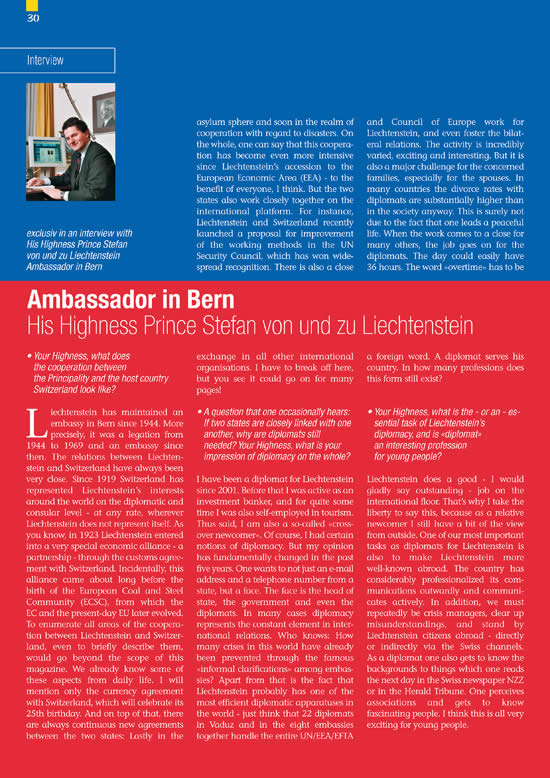 Ambassador in Bern
His Highness Prince Stefan von und zu Liechtenstein
Ambassador in Bern
His Highness Prince Stefan von und zu Liechtenstein
exclusiv in an interview with
His Highness Prince Stefan
von und zu Liechtenstein
Ambassador in Bern
• Your Highness, what does
the cooperation between
the Principality and the host country
Switzerland look like?
Liechtenstein has maintained an embassy in Bern since 1944. More
precisely, it was a legation from 1944 to 1969 and an embassy since
then. The relations between Liechten-stein and Switzerland have always
been very close. Since 1919 Switzerland has represented Liechtenstein’s
interests around the world on the diplomatic and
consular level - at any rate, wherever Liechtenstein does not represent
itself. As you know, in 1923 Liechtenstein entered into a very special
economic alliance - a partnership - through the customs agree-ment with
Switzerland. Incidentally, this alliance came about long before the
birth of the European Coal and Steel Community (ECSC), from which the
EC and the present-day EU later evolved. To enumerate all areas of the
coopera-tion between Liechtenstein and Switzer-land, even to briefly
describe them, would go beyond the scope of this magazine. We
already know some of these aspects from daily life. I will mention only
the currency agreement with Switzerland, which will celebrate its 25th
birthday. And on top of that, there are always continuous new
agreements between the two states: Lastly in the asylum
sphere and soon in the realm of cooperation with regard to disasters.
On the whole, one can say that this coopera-tion has become even more
intensive since Liechtenstein’s accession to the European Economic Area
(EEA) - to the benefit of everyone, I think. But the two states also
work closely together on the international platform. For instance,
Liechtenstein and Switzerland recently launched a proposal for
improvement of the working methods in the UN Security Council,
which has won widespread recognition. There is also a close exchange in
all other international organisations. I have to break off here, but
you see it could go on for many pages!
• A question that one occasionally hears:
If two states are closely linked with one
another, why are diplomats still
needed? Your Highness, what is your
impression of diplomacy on the whole?
I have been a diplomat for Liechtenstein since 2001. Before that I was
active as an investment banker, and for quite some time I was also
self-employed in tourism. Thus said, I am also a so-called «cross-over
newcomer». Of course, I had certain notions of diplomacy. But my
opinion has fundamentally changed in the past five years. One wants to
not just an e-mail address and a telephone number from a state, but a
face. The face is the head of state, the government and even the
diplomats. In many cases diplomacy represents the constant element in
international relations. Who knows: How many crises in this world have
already been prevented through the famous «informal clarifications»
among embassies? Apart from that is the fact that Liechtenstein
probably has one of the most efficient diplomatic apparatuses in the
world - just think that 22 diplomats in Vaduz and in the eight
embassies together handle the entire UN/EEA/EFTA and Council of Europe
work for Liechtenstein, and even foster the bilat-eral relations. The
activity is incredibly varied, exciting and interesting. But it is also
a major challenge for the concerned families, especially for the
spouses. In many countries the divorce rates with, diplomats are
substantially higher than in the society anyway. This is surely not due
to the fact that one leads a peaceful life. When the work comes to a
close for many others, the job goes on for the diplomats. The day could
easily have 36 hours. The word «overtime» has to be a
foreign word. A diplomat serves his country. In how many professions
does this form still exist?
• Your Highness, what is the - or an - es-
sential task of Liechtenstein’s
diplomacy, and is «diplomat»
an interesting profession
for young people?
Liechtenstein does a good - I would gladly say outstanding
- job on the international floor. That’s why I take the liberty
to say this, because as a relative newcomer I still have a bit of the
view from outside. One of our most important tasks as diplomats for
Liechtenstein is also to make Liechtenstein more well-known abroad. The
country has considerably professionalized its communications outwardly
and communicates actively. In addition, we must repeatedly be crisis
managers, clear up misunderstandings, and stand by Liechtenstein
citizens abroad – directly or indirectly via the Swiss channels.
As a diplomat one also gets to know the backgrounds to things
which one reads the next day in the Swiss newspaper NZZ or in the
Herald Tribune. One perceives associations and gets to know fascinating
people. I think this is all very exciting for young people.